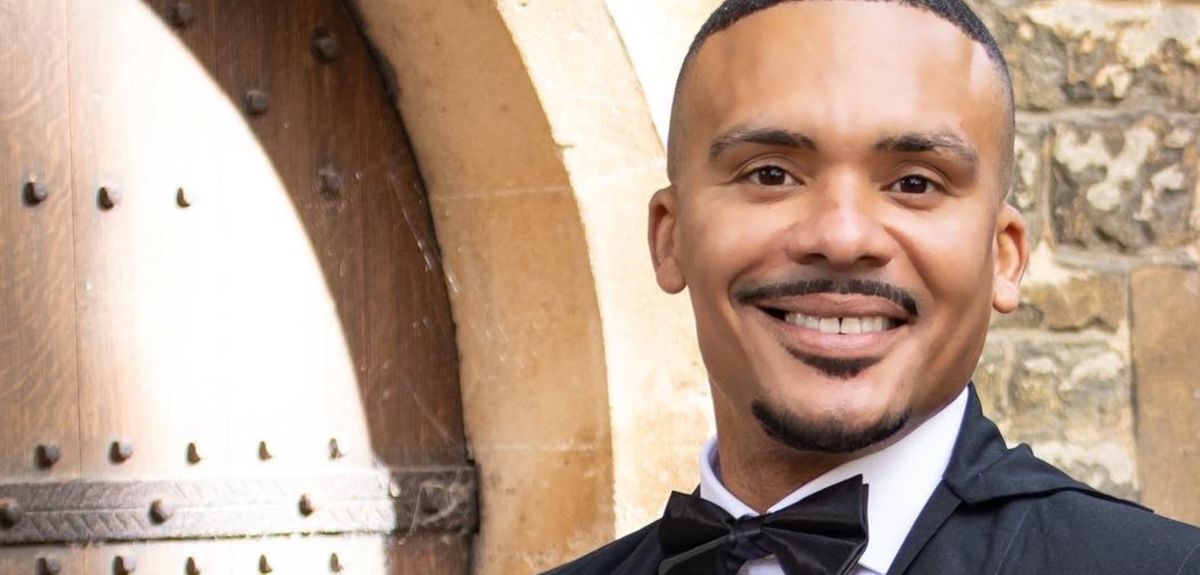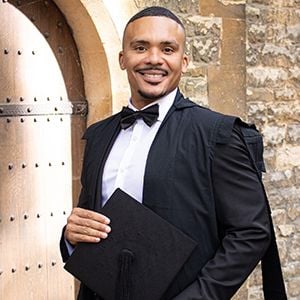
DPhil student, Frankco Harris, reflects on his unique journey to Oxford and future plans
Frankco Harris is a first-year DPhil Criminology student at St Antony’s. He is funded by the Economic and Social Research Council (ESRC) Grand Union Doctoral Training Partnerships which offer training to talented graduates to equip them to become 21st-century leaders in social science research with social and economic impact. He is also a St Antony’s College Warden’s Scholar; and a Black Academic Futures Scholar – part of the University’s flagship graduate access scholarship programme that aims to address under-representation and help improve equality, diversity and inclusion in the graduate student body. Frankco’s doctoral thesis is on the socio-spatial dynamics of gang violence in Bermuda.
Tell us about your research and passion for your subject
‘My thesis will critically examine Bermuda’s distinctive setting by unravelling the complex interplay of geography, society, and violence. The research will explore the role of “islandness” in shaping and constraining gang dynamics, reflecting and contributing to the global understanding of criminology in isolated contexts.
‘Growing up in Bermuda, a small, tight-knit community, I was exposed to its nurturing aspects and complex social dynamics that can lead to criminogenic outcomes. This environment helped me understand the subtle but significant impact of social exclusion, violence, and economic disparities on both myself and those around me. My childhood was a journey through these multifaceted challenges, instilling in me a deep empathy for those caught in cycles of violence and poverty and sparking my interest in the broader social structures that drive these issues.’
 Frankco Harris
Frankco Harris
‘My journey has been anything but ordinary. I arrived in the UK in 2007 to study Law. But I struggled with mental health and addiction issues and withdrew after the first year. I then went in another direction entirely – music production and sound engineering and spent some years DJ-ing and producing music.
‘With concerted effort, I overcame addiction and regained my academic focus. I returned to law school at the University of East London, starting from scratch and working multiple part-time jobs to support myself. This was incredibly challenging but my hard work paid off and I graduated top of my class, receiving the Dean’s Award for Academic Achievement. I went onto complete an MSc in Criminal Justice Policy at the London School of Economics and there I won the Titmuss Best Dissertation Prize for Criminal Justice Policy.
'As a first-generation university student, a gay individual and a person of colour, I have first-hand experience of multiple barriers that can obstruct a person’s education and professional aspirations. These personal experiences have further fuelled my determination to succeed and have instilled in me a deep belief in the transformative power of education. ’
What attracted you to studying here?
'Firstly, Oxford's renowned reputation for academic excellence aligns with my aspirations for rigorous scholarly investigation. The University's commitment to pushing the boundaries of knowledge helps me thrive. Secondly, Oxford offers unparalleled access to many resources, including world-class libraries, leading experts, and a diverse academic community. These are essential for the depth and breadth of research I’m doing. Finally, the multidisciplinary environment at Oxford is invaluable. I can collaborate with experts and students in various fields and this enriches my understanding of the complex social issues I’m studying.
The solutions to the most pressing social challenges often lie at the intersection of different academic disciplines, and Oxford provides the ideal setting for such cross-pollination of ideas
Frankco Harris
What has your Oxford experience been like so far?
‘Oxford has had a profound impact on me since the moment I arrived. Interacting with fellow students and faculty members who are passionate about their fields of study is truly motivating. The intellectual energy and enthusiasm permeating campus are infectious.
‘Equally inspiring is the sense of history that envelops Oxford. Walking through the historic colleges, libraries, and streets, I am reminded of the countless generations of scholars who have contributed to the world's body of knowledge from this very place. The change of scenery and pace of life, especially coming from the bustling city of London, has also been a welcome shift. The serene beauty of Oxford creates an environment that fosters reflection and contemplation. It's a place where I have found solace amid the academic rigour.’
Studying for a DPhil is intensive work. What do you do in your spare time to relax?
‘I wholeheartedly embrace the Italian concept of Dolce far Niente – the sweetness of doing nothing. I put my phone on silent and indulge in doing nothing at all. I find comfort in moments of quiet solitude.
‘I also like to stay physically active and use the St Antony’s gym. I find working out relaxing, I go for long runs and I practice meditation. And music remains one of my passions, a constant source of joy in my life and a means of escaping the demands of academia. All these activities contribute to a balanced life.’
You have ambitious plans for the future that involve returning to Bermuda. Can you tell us about this?
‘I am firmly committed to returning to Bermuda, my homeland, and serving my community as a civil servant. Having spent more than 18 years in the UK, I’m eager to return and contribute to the improvement of Bermuda’s criminal justice system and related social issues. I also hope to establish my own charities, focusing on rehabilitiation and education to address critical needs in the community. I want to support individuals seeking to desist from criminal behaviour and provide educational opportunities to under-served populations.
‘I plan to continue my research and writing, concentrating on the emergent field of island criminology, rehabilitation and desistance, social policy and criminal justice issues. I would love to teach Criminology at Bermuda College.’
What would you say to prospective Oxford students who also come from disadvantaged or complex backgrounds?
‘Being here at Oxford represents much more than a personal achievement: it serves as opportunity to be a visible example to others who have faced similar adversity and come from challenging backgrounds. My success demonstrates that despite facing formidable obstacles, one can succeed and excel in academia and beyond. My presence at Oxford is a testament to the idea that barriers can be overcome and dreams can be realised through determination and resilience.’
Read a longer interview with Frankco here
 What Louise Thompson’s campaign tells us about the national maternity crisis
What Louise Thompson’s campaign tells us about the national maternity crisis Celebrating 25 Years of Clarendon
Celebrating 25 Years of Clarendon  Learning for peace: global governance education at Oxford
Learning for peace: global governance education at Oxford  What US intervention could mean for displaced Venezuelans
What US intervention could mean for displaced Venezuelans  10 years on: The Oxford learning centre making an impact
10 years on: The Oxford learning centre making an impact Oxford and The Brilliant Club: inspiring the next generation of scholars
Oxford and The Brilliant Club: inspiring the next generation of scholars New course launched for the next generation of creative translators
New course launched for the next generation of creative translators The art of translation – raising the profile of languages in schools
The art of translation – raising the profile of languages in schools